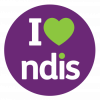Autism Awareness Week is a great opportunity to spread awareness of Neurodiverse-affirming practices and acknowledge the diversity of all people. Ability Action Australia’s Speech Pathology team has created a Neurodiverse-affirming, strengths-based program for our NDIS participants.
Neurodiverse-affirming practice moves away from the traditional medical model of practice which focuses on impairment, and instead focuses on the individual’s strengths to provide functional outcomes.
What is Neurodiversity?
Neurodiversity describes the idea that people experience and interact with the world in many different ways. It is often used in the context of autism and neurological or developmental conditions.
Neurodiverse individuals may have a range of conditions, including:
• Autism
• ADHD
• Dyslexia
• Obsessive Compulsive Disorder (OCD)
• Dyspraxia
• Other neurological conditions
What is Neurodiverse-affirming therapy?
Neurodiverse-affirming therapy involves providing services and support that are respectful and responsive to the individualised needs and preferences of our participants. As Neurodiverse-affirming clinicians, we work to a strengths-based framework, provide support and adaptations that affirm the participants neurodivergent identity, and focus on functional outcomes.
Our Speech Pathology team has found that using a strengths-based perspective during therapy with neurodivergent participants can increase participation, comfort and connection. Using this framework helps provide the tools to build authentic relationships, build self-awareness and increase functional and quality of life outcomes.
How can therapists create a framework to provide neurodiverse-affirming practice?
• Acknowledge and confront personal biases by listening to neurodivergent voices and seeking to understand their perspectives. Use identity-first language unless a neurodivergent person prefers person-first language and avoid using functioning labels like high or low functioning that can be stigmatising.
• Support and accommodate sensory needs, including regulating behaviours (stimming) to provide a comfortable and safe environment for participants, and advocate for these supports across all environments.
• Encourage and facilitate authentic neurodivergent socialising, not masking, and helps participants understand their own social behaviour and preferences as well as neurotypical social communication.
• Reduce stigma and normalise neurodivergent behaviour by educating neurotypical people about neurodiversity and the importance of respecting individual differences.
Working with Neurodivergent participants, we strive to:
• Develop and build a relationship – taking the time to understand the individual’s unique strengths, interests, and needs, and building a rapport based on mutual trust and respect.
• Know the language – using identity-first language and avoiding functioning labels to promote a sense of belonging and familiarise ourselves with different terms and concepts used in the neurodiversity community.
• Think about the therapy environment – creating a space that is comfortable and accommodating to the individual’s sensory needs. This may include adjusting the lighting, temperature, and noise levels, as well as providing sensory tools and equipment that may help the individual to regulate their sensory input.
• Reflect on our own practice – being open to feedback and willing to adapt our approach to meet the individual’s needs.
• Assume Competence – recognising that individuals with neurological differences have their own unique strengths and abilities, and that these should be celebrated and built upon in therapy. By assuming competence, we can help to empower participants and promote a sense of self-efficacy and confidence.
• Listen to Autistic Voices – actively seeking out and incorporating the perspectives and experiences of autistic and neurodiverse individuals into our practice. By doing this, we can ensure that our therapy is respectful, responsive, and truly affirming of neurodiversity.
As Alexander Den Heiier once said, “When a flower doesn’t bloom, you fix the environment in which it grows, not the flower.” By providing a space for neurodiversity and inclusion, we create an environment that supports the growth and development of all individuals, regardless of their neurological differences.
Talk to us
If you would like further information on Speech Pathology services, please contact our friendly concierge service on 1800 238 958 or complete the request contact form and we will contact you at a time that suits you best.
References:
https://reframingautism.com.au
https://www.autismcrc.com.au/knowledge-centre

